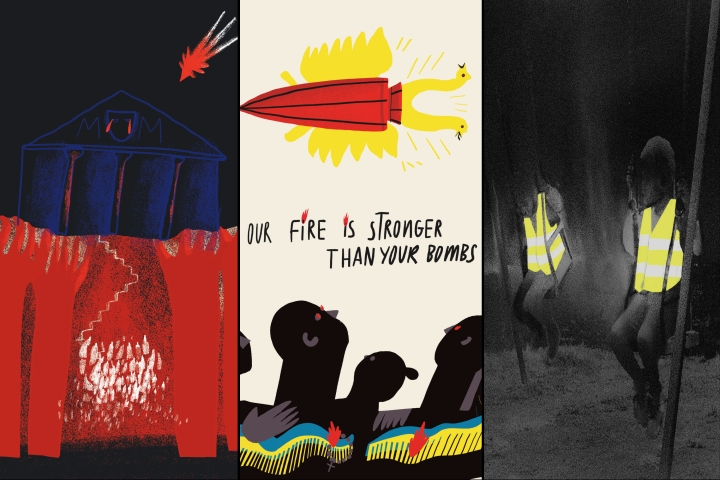An exhibit of Ukrainian art opening next week in Baker-Berry Library will mark one year since the beginning of Russia’s 2022 invasion. Our Fire Is Stronger Than Your Bombs, which includes a digital component, features work created by eight illustrators from Ukraine in response to the ongoing war.
Bogdana Davydiuk’s piece Fire, from which the exhibit takes its name, depicts powerfully built block figures, their fiery eyes fixed on a missile flying overhead.
“Our main message is not, ‘Please help us because we are suffering,’ which is true, but that this war has shown that Ukrainian people are very brave, and sometimes even fearless, as Ukraine continues to fight for its future, and its freedom,” says Veronika Yadukha, Guarini ’23, one of the show’s curators. “Our fire is really very powerful, we just need help, and we appreciate all the support from everybody who wants to help.”
An opening reception at 5 p.m. on Feb. 24 will include readings by Yadukha; Hanna Leliv, a co-curator and Leslie Center Faculty Fellow; Lada Kolomiyets, a Harris Visiting Professor in the Comparative Literature Program; and Daryna Gladun, Guarini ’24, and a Ukrainian poet, translator, artist, and researcher. The exhibit will remain up through March 31.

The display in the Baker-Berry Library Brickway aims to evoke a streetscape, “and how posters like these might be posted, not only as an artistic gesture, but also to communicate information about the war,” says co-curator Jill Baron, a research and learning librarian at the library.
The text accompanying the images is deliberately short, to preserve the immediacy of effect, says Yadukha, who is pursuing a master’s degree in comparative literature.
Those who want to learn more can use their phones to access the parallel digital exhibit. Created with support by August Guszkowski ’22 and other staff from Digital by Dartmouth Library, it provides more extensive information about the artists and their work.
For example, Mariupol, also by Davydiuk, portrays in stark primary colors the Donetsk Academic Regional Drama Theatre and a missile hurtling through the sky toward the building.
“I wouldn’t say that the illustration is traumatizing by itself. You just know that something bad is going on,” Yadukha says. “But if you go to the digital exhibit, you will read that on this particular date, this theater was bombed, and about 600 people died. In this case, the illustration becomes an even more informative medium than photo documentation, which can be shocking and simply block one’s comprehension.”
Similarly, Mobile Phones, by Mari Kinovych, depicts dozens of phones nailed to a tree, a reference to what happened in Kozacha Lopan, a village in the Kharkiv region.
When Russian soldiers occupy an area, one of the first things they do is cut off communications, says Leliv, a literary translator from Lviv.
As Ukrainians attempted to use their phones to call their relatives or friends and check the news, Russian soldiers snatched the devices and nailed them to trees, she says. “You can only imagine what would happen to the people.”
Leliv says the show is designed to remind people that even after a year, the war is still raging, and to showcase the “hugely creative,” resilient community of contemporary Ukrainian artists.
Most of the illustrators featured in the show live and work in Ukraine, under the threat of bombardment and sometimes without power, water, cell signal, or internet connection.
“They’re doing great art on a very complicated topic, even as they’re caught in the middle of this horrifying war,” Leliv says. Spotlighting the artists and their work is a way to remind and encourage people “to help us continue to stand strong.”
The exhibit is sponsored by the Leslie Center for the Humanities and Dartmouth Library, with additional support from the Comparative Literature Program.

